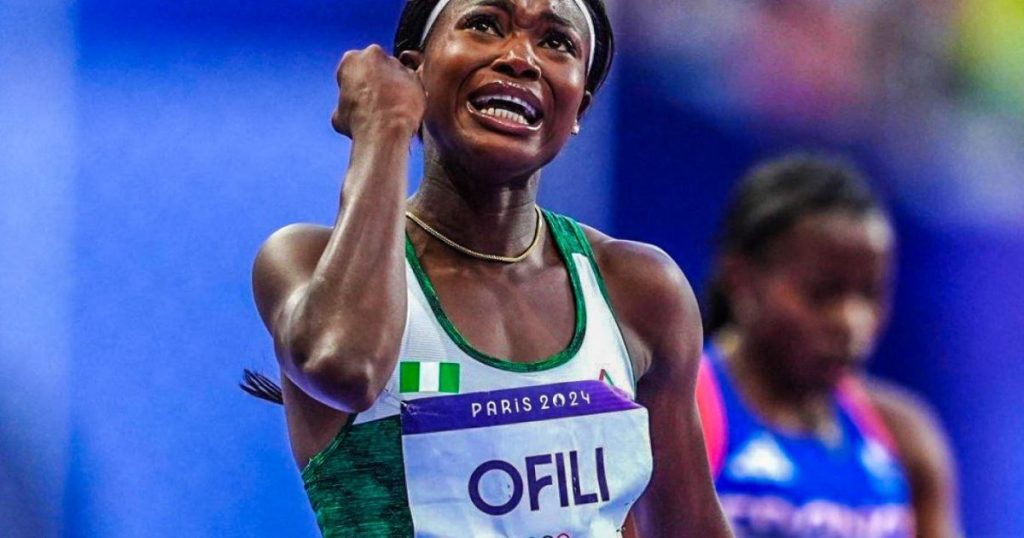The Nigerian athletics community has been jolted by the news of Favour Ofili’s potential switch of allegiance to Turkey. Ofili, the current world record holder in the women’s 150m, is a rising star in Nigerian athletics and her potential departure represents a significant loss for the nation. While the Athletics Federation of Nigeria (AFN) awaits official confirmation from World Athletics, the news, initially reported by a Jamaican journalist, has sparked a wave of disappointment and introspection within the federation. AFN president, Tonobok Okowa, expressed his shock and sadness at the development, acknowledging the federation’s shortcomings in supporting Ofili and other athletes.
Okowa’s statement reflects a mixture of disappointment, resignation, and a sense of responsibility for Ofili’s decision. While admitting the AFN’s failures, he also hinted at Ofili’s agency in the decision, suggesting she had been actively pursuing the Turkish option. This sentiment suggests a complex interplay of factors influencing Ofili’s decision, extending beyond mere administrative lapses on the part of the AFN. Despite the blow to Nigerian athletics, Okowa stated the AFN would not impede Ofili’s decision, acknowledging her right to choose her path while still considering her a part of the Nigerian sporting family. The apology issued to Nigerians and the global athletics community underscores the magnitude of the loss and the AFN’s recognition of the impact on national pride and the sport’s image.
The timing of Ofili’s potential switch, just months before the 2025 World Athletics Championships in Tokyo, adds another layer of complexity to the situation. Ofili had already qualified for the championships, representing Nigeria. Her departure would leave a void in the Nigerian team and diminish the nation’s chances of success at the prestigious event. It also raises questions about the future of Nigerian athletics and the ability of the AFN to retain its top talent. The incident highlights the vulnerability of developing nations in the face of aggressive recruitment tactics employed by wealthier nations, potentially creating an uneven playing field in international athletics.
The case of Favour Ofili adds to a growing list of Nigerian athletes who have switched allegiances to other countries. This trend underscores systemic issues within the Nigerian sporting ecosystem, including administrative inefficiencies, lack of adequate athlete support, and financial constraints. Athletes like Francis Obikwelu (Portugal), Gloria Alozie (Spain), Florence Ekpo-Umoh (Germany), Salwa Eid Naser (Bahrain), and Femi Ogunode (Qatar) all achieved international acclaim after leaving Nigeria, suggesting that while talent is abundant within the country, the system often fails to nurture and retain it.
The Turkish athletics body has reportedly been actively recruiting foreign athletes, including Jamaicans, and offering substantial financial incentives for switching allegiances. This aggressive recruitment strategy has raised concerns about the ethical implications of such practices and the potential for creating an uneven playing field in international athletics. The allure of financial security and better training facilities often proves irresistible for athletes from developing countries, leaving nations like Nigeria struggling to compete on the global stage. While athletes have the right to choose where they represent, the financial inducements offered by some nations create a system that favors wealthy countries and potentially undermines the spirit of fair competition.
The Ofili situation serves as a wake-up call for the AFN and the Nigerian sporting authorities. Addressing the underlying issues that drive athletes to seek opportunities elsewhere is crucial for the future of Nigerian athletics. This requires a multi-faceted approach that includes improved administrative practices, increased investment in athlete development programs, and the creation of a more supportive and rewarding environment for athletes. Failure to address these issues will likely result in further talent drain and limit Nigeria’s ability to compete successfully on the international stage. The AFN’s apology and acknowledgement of its shortcomings are a first step, but concrete actions are needed to rebuild trust and create a sustainable future for Nigerian athletics. The future of Nigerian athletics depends on the ability of the governing bodies to learn from these experiences and create a system that nurtures and celebrates its homegrown talent.














